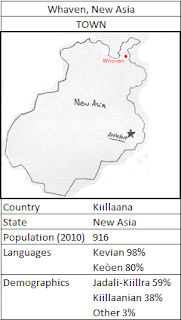 Whaven /'ɸeɪvɪn/ is a very small coastal town occupying the extreme northeast coast of New Asia and the peninsula thereof. It is the northernmost coastal city in the state of New Asia, located 31 miles north of Aoin and 72 miles north of Taleah.
Whaven /'ɸeɪvɪn/ is a very small coastal town occupying the extreme northeast coast of New Asia and the peninsula thereof. It is the northernmost coastal city in the state of New Asia, located 31 miles north of Aoin and 72 miles north of Taleah.History
Whaven is one of the earliest settlements with a Keòen name outside of Jadali. It was first established by Kiillaanian fishermen in as early as 1010 though it did not gain an official name until it was signed as an official town of Kiillaana in 1039. Though the name uses the uniquely Keòen sound "wh" it does not mean anything in the Keòen language. The name was agreed upon by the native settlers who wanted to make it sound "exotic." Another reason that the name is not truly a Keòen word lies in the fact that the A makes a long A sound and not the typical phonetic sound associated with the letter A.
Due to the overcast and wet nature of Whaven the town never became very popular and quickly gained a reputation for being "a gloomy, dreary, washed-out sea port" as said by Mera Visi in his journals. Whaven did not have a lot of resources to offer and the descendents of the fishermen turned instead to law and built the Whaven Prison which the town is still famous for today. Convicts and other prisoners from Jadali were all taken here to serve their sentences as well as a handful of Kiillaanians throughout the ages.
Over the next 300 years Whaven was a small collection of buildings on the map and really did nothing more but hold prisoners and employ guards but all of that changed in 1354 when a strong branch of the enemy army involved in Terabi's War marched into Whaven and made it their military capital. Over the course of that war (1354-1360) the population of Whaven grew from about 100 people to over 10,000 soldiers and the town tripled in size. During this time Jadali closed its sister port of Resa Ere under the command of Drakon Lochgren and the only ships that left Whaven went down the coast within Kiillaana.
When Terabi's war was drawing to a close, Terabi himself appeared on Whaven's doorstep. He and Arador Montàlo, the next Eldin of Leena, defeated the final leader of the enemy army and the resulting battle killed over half of Whaven's soldier inhabitants. The remaining enemy soldiers that surrendered were taken prisoner of war and were released to colonize the islands to the south, causing the population of Whaven to turn once again.
After Triumphant Day in 1360 Whaven became inhabited by the soldiers of Jadali and Kiillaana and a history center was established. The prison was again operational, holding a number of prisoners of war who later lived there. However, the drabness of the town caused many to leave after a few years and it dwindled down to an average of 1000 residents. The prison continued to function until it was officially closed and made into a landmark in 1785.
Today Whaven has about 900 residents and is home to a history center dedicated to the dealings of Terabi's War, the remains of the prison which can be visited, and a small high school that accepts about five Jadali students every year into its program. The port is once again open and a small ferry runs once a day at noon between Kiillaana and Jadali, though it is mainly used to take hikers to southern Montàlo and back and is no longer used to ferry prisoners across the sea.
Attractions
Whaven Prison State Monument
Triumphant Day Historical Center
Triumphant Day Museum
Port of Whaven
Whaven Mainland School
Coastal Location
-Whaven
-Aoin
-Taleah
-Ameresa
-Cobh de Via
-Edelhod
-Kosweci
-Peltobh
-Freylain
-Shoer del Fin
-Attlefort
-Skapo
-Southlain
-Rythor
-Cantade Fina
-Keso Machi
-Reed
-Iriborda
Demographics
Today Whaven has two official languages, Kevian and Keòen, both of which are spoken by most of the population. Much of the population is Jadali-Kiillra who enjoy the quiet nature of this little town and many are descendants of soldiers throughout the ages.
Names
Whaven is a unique town in that most of its residents have kept the ancient Kiillra tradition of not adopting a crest. Being in a remote area, this part of Kiillaana in general was the last to adopt the order of crests given by the king and many rejected this command. Today, about 90% of the population goes without a crest and are instead given a two-name title. Upon marriage a woman does not traditionally change her name to that of her husband's. To avoid confusion all Whaven residents are assigned a number which they use for genealogy purposes.
People Mentioned From Whaven
Carrington Lionheart
Myron Verdin

No comments:
Post a Comment